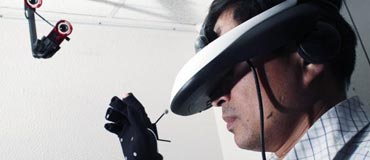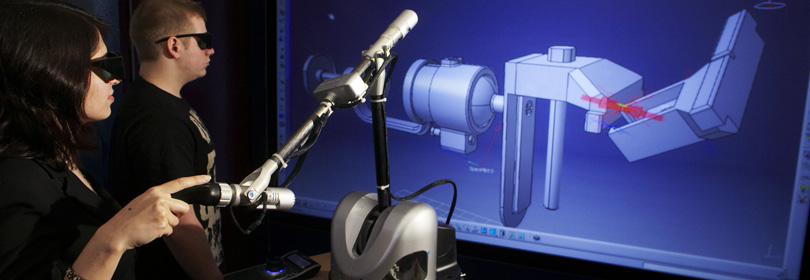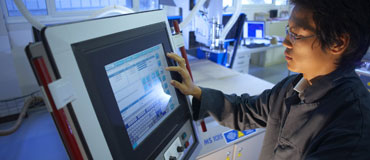Les travaux de l'équipe Conception Collaborative et Intégrée visent à comprendre et modéliser les interactions entre experts-métiers participant à la conception de produits manufacturiers et/ou des services associés, et à proposer des supports (fondés sur les représentations métiers), des outils (intégrés aux environnements des concepteurs) et des méthodes (intégrées à l'organisation de l'entreprise) pour faciliter ces interactions. [En savoir plus]
Axes de recherche

Interactions complexes dans les environnements numériques de conception
- Environnements numériques immersifs pour la conception
- Etudes expérimentales des nouvelles métaphores d’interaction
- Approches cognitives des interaction médiées dans les environnements numériques
Sciences de la conception pour comprendre et accompagner les mutations à l’oeuvre dans les entreprises et la société
- Systèmes produit-service, servicisation des offres
- Nouvelles formes d’industrialisation locale, urbaine, soutenable
Approches collaboratives vers la réduction des impacts environnementaux de l’industrie et la réappropriation des technologies par les citoyens,
- Approches collaboratives dans les territoires, dans les collectifs ouverts (espaces d’innovation, maker spaces…)
- Accompagnement des incubateurs d’innovation dans les pays en développement
- Approches open-source, étude des mouvements citoyens (repair café, approches lowtech, makers spaces…)
Sujet de thèse, Post Doc et Ingénieurs de recherche
Projets en cours
ANR PEPR eNSEMBLE (2024-2027) (Website)
The purpose of the PEPR eNSEMBLE (Future of Digital Collaboration) is to fundamentally redefine digital tools for collaboration. To achieve this goal, we need to invent mixed (i.e. physical and digital) collaboration spaces that do not simply replicate the physical world in virtual environments, enabling co-located and/or geographically distributed teams to work together smoothly and efficiently. As part of the PEPR eNSEMBLE, G-SCOP was awarded a PhD scholarship to understand the influence of visual metaphors on cognitive and transdisciplinary collaborative conceptual co-design activities. The aim of the thesis is threefold. First, the fundamental objective is to understand how interactive visual representations influence the cognitive and collaborative activities of stakeholders involved in co-design activities. Second, a methodological aim is to propose a protocol for evaluating visual metaphors and metrics for measuring cognitive and collaborative activities in a transdisciplinary computer-mediated co-design activity. Third, the final goal is to develop ergonomic recommendations that provide concrete, actionable guidance for designing and evaluating virtual metaphors and ease the adoption of interactive visualisation in collaborative conceptual design phases.
ANR LabCom Joint Research Lab MIMESIS (2024-2029) (Website)
AI-Driven Engineering Assistance System (AIDEAS) (2023-2026) (Website)
Local Accessible Urban Digital and Sustainable Factories - LAUDS - (2024-2027, Europe) (website)
Toward small, versatile factories in local and urban areas to co-create and produce customised products in small series. Contact: Jean-François Boujut
Systems Engineering for New MedTech Combination Product Development (Contrat privé, 2022-2024)
This action research project, funded by Becton Disckinson, integrates various methodological engineering design elements into a model-based systems engineering framework (process, method, modelling method, modelling language, modelling software) to support the Advanced Drug Delivery Systems division of Becton Dickinson Medical Pharmaceutical Systems in the development of future new MedTech drug-device combination products.
Eager to learn more ? Contact Romain Pinquié.
ACCEL 4.0 (PIA)
Le projet ACCEL 4.0 a pour objectif de développer des dispositifs de formation et d’accompagnement innovant qui associe l’écosystème industriel, académique et scientifique dans une démarche de co-construction. Il s’appuie sur un consortium de cinq partenaires engagés : l’UIMM Ain, Grenoble INP – UGA, le Pôle formation AFPMA, le lycée polyvalent Carriat.
ArchiTool (ANR)
Vise à proposer une plateforme de conception d'architecture produit basée sur les méthodes du MBSE mais supportées par les technologies de réalité viirtuelle.
Coherence 4D (ANR)
Vise à travailler le maintien de la cohérence d'un jumeau numérique vis à vis de son jumeau physique. Le projets propose différents types d'outils et méthodes dont des solutions en RV et RA soutenues par le laboratoire G-SCOP.
Continuum+ (Equipex)
Infrastructure nationale permettant aux chercheurs de travailler en réseau.
Titus
Ce projet franco-anglais vise à proposer des solutions de télé-opération de robots pour de la maintenance via un pilotage en réalité virtuelle.
Tous les projets passés
Actualités
-
Soutenance de thèse Chao ZHANG (CCI) - Jeudi 10 Juillet 2025 à 14h00 - dans l’amphithéâtre André SAUZE (J001) du Campus d’Aix-en-Provence, Arts et Métiers et en visio
Intitulée : « Reconstruction de modèles CAO paramétriques 3D basée sur l'apprentissage automatique à partir de dessins 2D» -
Soutenance de thèse de Abdelhadi LAMMINI (CCI) mercredi 21 mai 2025 à 14h00 en amphi Gosse - Site Viallet Grenoble
intitulée : " Mise en œuvre de la XR pour le maintien de la cohérence des jumeaux numériques"






